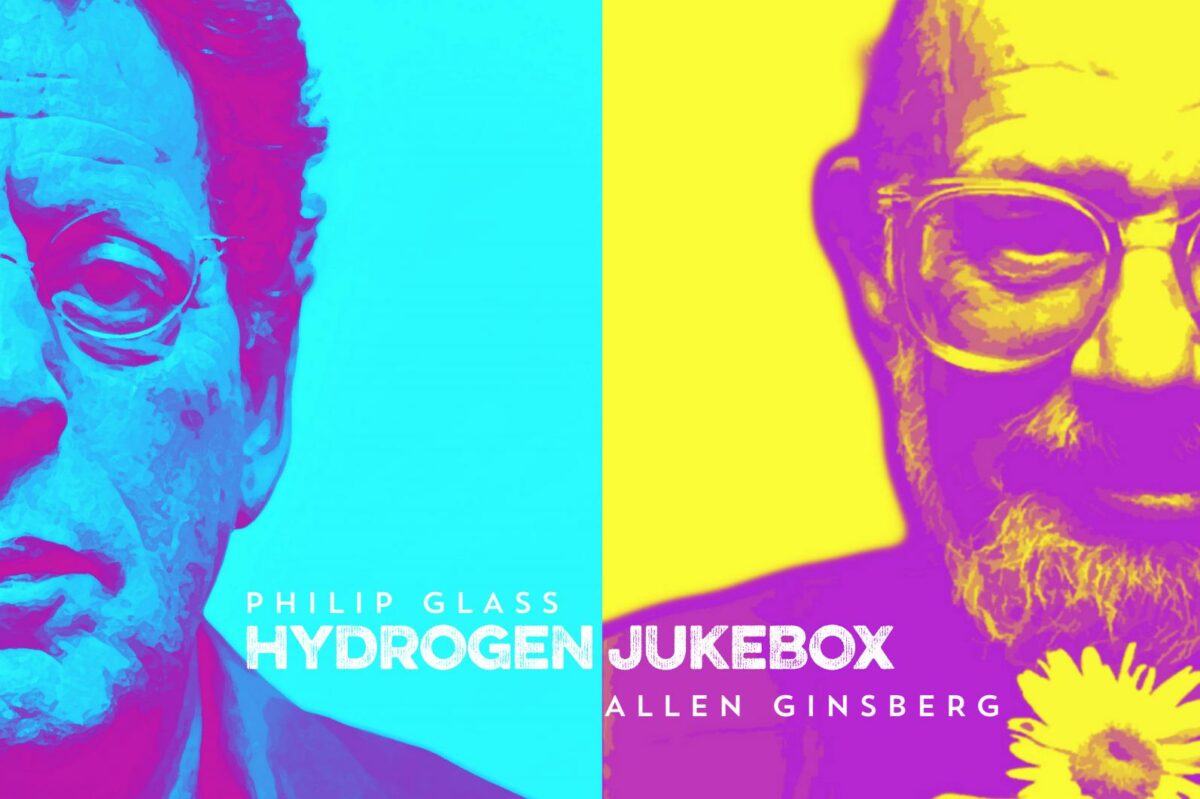
Though Hydrogen Jukebox has no real story itself, at least not in a straightforward or narrative sense, the story of the song cycle’s conception is the stuff of legend.
Meeting back in 1988 at the St. Mark’s Bookshop (sadly one of the last great bookstores still standing in Manhattan), minimalist classical composer Philip Glass met revolutionary beat poet Allen Ginsberg and asked him to perform with him. They chose Ginsberg’s classic anti-war poem, Wichita Vortex Sutra as their text, and Glass composed a piano piece to accompany Ginsberg’s reading of his poem.
The reading went so well, the two decided to further collaborate, creating a full length work for a small orchestra and six voices with text compiled from Ginsberg’s catalogue of poetry. Hydrogen Jukebox was the result of their collaboration and it premiered in May of 1990 in Charleston, South Carolina.
Conceived as a psychedelic fever-dream, the work spans the counter-cultural world view from the 1950s through the 1980s, touching on all of Ginsberg’s familiar subject matters: sex, drugs, Buddhism, homosexuality, religion, politics, the Vietnam War, freedom of thought and self-expression. The song-cycle is non-linear and mostly non-narrative, though each staged production creates its own conceptual vision for the piece.

Long Beach Opera’s production, which just completed a one week run in a former canning warehouse in San Pedro, succeeded in creating an atmosphere for the material that gave it a contemporary resonance. It also sounded beautiful, giving Glass’s score the justice it deserves. Unfortunately, the production also struggled to find a consistent performance style that could elevate the material to the heights it longed to reach.
Director David Schweizer smartly chose to bring Ginsberg’s physical presence into the song-cycle, casting Michael Shamus Wiles as a poet that evoked Ginsberg without literally trying to be him.
Wiles spends most of the performance atop a large piece of portable scaffolding, watching over and influencing all of the theatrical goings-on. Wiles played the role smartly by not trying to impersonate the great poet, yet still tapping into his essence. His delivery of Wichita Vortex Sutra, from atop his pulpit as Glass’ hypnotic piano piece joined his words, was unquestionably the highlight of the evening.
The six main singers were billed as “characters in search of a poet” and were smartly dressed in all black, allowing them to shift seamlessly from song to song and place to place.
There were also a number of players dressed all in white billed as “disciples of the poet” who helped with the physical shifting of the space.
 Caleb Wertenbaker’s understated but brilliantly conceived scenic design filled the warehouse with a series of movable wooden crates for the action to take place on. He also smartly employed a vinyl tarp that covered the entirety of the thrust stage’s space for a segment that was supposed to evoke New York City after the apocalypse.
Caleb Wertenbaker’s understated but brilliantly conceived scenic design filled the warehouse with a series of movable wooden crates for the action to take place on. He also smartly employed a vinyl tarp that covered the entirety of the thrust stage’s space for a segment that was supposed to evoke New York City after the apocalypse.
Likewise Dan Weingarten’s lighting helped to make the action flow fluidly and with dramatic clarity. For taking place in such a big space, we nearly always knew where to look.
Though each member of the cast sang beautifully (with an extra special shout out to Roberto Perlas Gomez whose voice just floored me) and Kristof Van Grysperre’s small orchestra played the score beautifully, I couldn’t help but often feel that the style of the main singer’s performances, aside from that of The Poet, often felt forced in their theatricality.
By often leading his actors into the realm of sensory improvisation, Schweizer too often created a world that reminded me of actors playing theater games, a choice which tended to distract me from the beauty of the source material.
Sometimes, these experiments would properly align, and the elements would assemble like a strange new constellation in the sky, but these were often the moments when Hydrogen Jukebox was the most still and least concerned with being “theatrical.” The added complication of only having the lyrics projected on one of the spaces four walls made following the text rather difficult, especially from my vantage point which was rather close to the single screen.

Even these consistent distractions were not enough to sink the material, however, as the music, words and voices are more than enough to create something powerful and special.
In the wake of a teacher recently losing his job due to sharing a crucial homo-erotic Ginsberg text with a student who had asked for it, Hydrogen Jukebox proves itself today to be just as crucial and relevant as ever. Even some misguided staging couldn’t bury the potency of Ginsberg’s words. I hope this production proved to be more of a call to arms than a eulogy.

